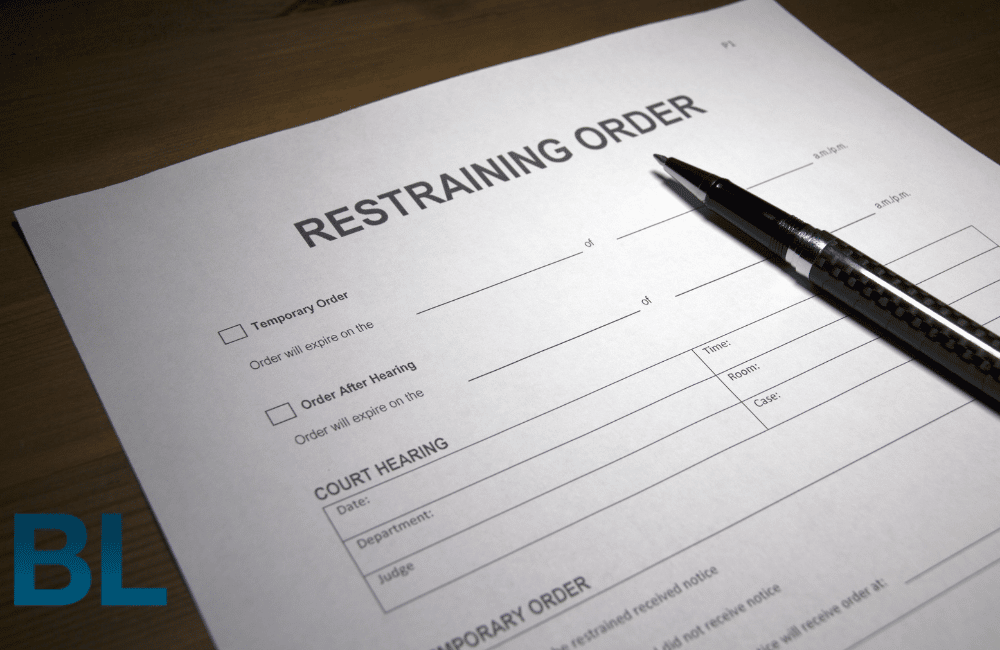Aggressively Fighting for the Best Possible Outcome
TAMPA RESTRAINING ORDER DEFENSE LAWYER
Protect Your Reputation Today
If you have been accused of domestic violence or another violent offense, it is possible you may have a restraining order filed against you, also known as an order of protection or protective order. In the state of Florida, a restraining order is officially known as a “petition for an injunction for protection against domestic violence or repeat violence.” Any individual who claims to feel seriously threatened may file one of these petitions with a judge, leading to potentially major consequences for the individual the order has been filed against.
At Buda Law, our Tampa domestic violence attorneys have defended many individuals served with restraining orders. Below, we’ll further explain the purpose of violent offense and domestic violence injunctions and what to do when faced with one.

To get started with an initial consultation today, call Andrew Buda of Buda Law today at 813-322-2832.
Is a Restraining Order the Same Thing as an Injunction?
Injunctions and restraining orders can be used for very similar purposes. The main difference between the two is that an injunction can be used to impose restrictions on the offender before they’ve been charged with a criminal offense, while a restraining order is issued at the end of a criminal case. A restraining order can be issued whether or not the offender was found guilty.
Types of Injunctions in Florida
Under Florida criminal law, there are six different types of injunctions. They each have different requirements based on the relationship between the people involved.
Domestic Violence Injunction
An injunction can be filed against someone who is living with or has lived with or had an intimate or romantic relationship with another person. Domestic violence includes assault or aggravated assault, battery or aggravated battery, sexual assault, sexual battery, stalking and aggravated stalking, kidnapping, false imprisonment, or other crimes that could result in injury or death to the petitioner.
Sexual Violence Injunction
An injunction can be filed when a relationship does not meet the definition of domestic violence and the other person committed one of the following:
- Sexual battery as defined by Florida statutes
- Crude acts upon or in the presence of a child younger than 16.
- Lured or enticed a child as described by Florida statute
- Required a child to sexually perform as outlined in Florida statute
- Committed any forcible felony wherein a sexual act was committed or attempted.
A sexual violence injunction may also be issued if a person has been in prison for sexual violence and is scheduled to be released within the next 90 days.
Dating Violence Injunction
Dating violence injunctions can be filed if the people involved have dated for the last six months, had an expectation of continued sexual involvement and affection, and interacted frequently and continuously during the relationship. If all three of these apply, then a petition can be filed.
Repeat Violence Injunction
If the situation does not fit into any of the three scenarios above, a repeat violence injunction may be filed. Petitioners filing repeat violence injunctions can include neighbors, co-workers, students, or relatives who have never lived together. There must be at least two incidents of physical violence, threats of violence, or stalking. At least one incident must have happened within six months of the complaint.
Stalking Injunction
A stalking injunction is filed when there have been two separate stalking incidents. Stalking injunctions can restrain a person from several activities, depending on the circumstances. A judge can grant a stalking request to prevent an alleged stalker from doing any of the following:
- Contacting the victim, whether in person, by phone, or by any other means
- Initiating any physical contact with the victim
- Having any firearms or weapons in their possession

How Does an Injunction Order Work in Florida?
Under Florida law, any individual over the age of 18 claiming to be a victim of violence is eligible to file a restraining order, regardless of the veracity of their claims. In some cases, an alleged victim may also petition a judge for a restraining order over claims of harassment and stalking. Restraining orders have swift and serious repercussions for those whom they are filed against and are extremely difficult to fight without the assistance of a seasoned Florida criminal defense attorney.
Understanding the Restraining Order Process
In Tampa, FL, restraining orders may have the following consequences:
- Restraining orders are a matter of public record, meaning they show up on all background checks and are accessible by any potential employers, housing associations, etc.
- Restraining orders cannot be sealed or expunged from your permanent record, regardless of whether the court denies the issuance of an injunction
- A restraining order will take away your right to purchase a firearm
- A restraining order may bar you from seeing or severely limit your ability to spend time with your own children, even though you will still have to pay child support while your restraining order is in effect
- A restraining order may force you to complete a psychological exam or to attend spousal abuse/domestic violence abuse programs while it is in effect
Are Restraining Orders Permanent?
Restraining orders can be either temporary or permanent. A temporary restraining order usually goes into effect immediately after it is issued and only lasts for a short period of time (usually 5 to 15 days). The purpose of a temporary restraining order is to prevent any harm from occurring before an official hearing can be held.
A permanent restraining order lasts for longer periods of time and can be put into effect as many as several weeks to years, and in some instances, for an indefinite amount of time. They are often used as a means of protection for victims of certain crimes, such as domestic abuse, child abuse, sexual assault, harassment, stalking, and other offenses.

What Happens If I’m Charged With Violating a Restraining Order?
Violating a restraining order is a misdemeanor of the first degree in Florida, punishable by up to 1 year in jail and a fine of up to $1,500. A third or subsequent violation of a restraining order is a third-degree felony, punishable by up to 5 years in prison and a fine up to $5,000. You could even face additional penalties for a separate crime, like committing a new act of domestic violence.
A person found guilty of a restraining order violation in Florida may also have to pay economic damages to the alleged victim, if he or she sustained any type of physical injury or loss as a result of the violation. This may include the payment of attorney’s fees and other costs to enforce the restraining order.
Why Hire a Tampa Restraining Order Attorney?
Although fighting a restraining order is often difficult, with the assistance of a skilled defense attorney, it is far from impossible. In many cases, an alleged victim has no evidence to support their petition other than witness testimony. Without any physical evidence, a lawyer may be able to help you argue that the charges against you are unfounded and poke holes in any facts presented. In other cases, your attorney can help you produce documents that corroborate your side of the story. If an accuser claims you have been harassing them but can produce phone logs or digital correspondence, for instance, it may be possible to argue that their allegations are inconsistent with reality. Your lawyer can also help assemble character testimony, so there are individuals on your side who will corroborate your side of the story.
If you or someone you know is facing a restraining order, a temporary injunction, or a permanent injunction, it is extremely important that you hire an experienced attorney to potentially avoid the harsh consequences that result. Orders of protection put extreme limitations on your basic rights, and may interfere with your ability to seek employment and find a place to live, as well as your general reputation and standing. That’s not to mention the criminal penalties that may come from a conviction of a violent crime. Fortunately, our skilled Tampa restraining order attorney at Buda Law provides compassionate and comprehensive representation and put up a strong defense at your restraining order or injunction hearing. If you or someone you know is facing a restraining order, don’t wait until it’s too late. Protect your rights and call Buda Law today.

Contact Tampa, Florida Restraining Order Defense Attorney Andrew Buda Today
With over 30 trials under his belt, Attorney Andrew Buda truly knows how to stand up for his clients facing criminal charges and injunctions. As a former prosecutor, he has an in-depth understanding of both sides of the criminal defense system and knows what it takes to protect your legal rights. With a strong history of favorable case results, you can always trust him to craft the best defense for your needs. Call now for a Tampa restraining order lawyer who cares, and begin your path toward justice today.
No matter what the scenario is, you deserve your day in court. Contact Buda Law for a free initial consultation today if you are facing a restraining order in Pinellas or Hillsborough County and let our experienced criminal defense attorney advocate for you.
CALL 813-322-2832 TO REQUEST A FREE CONSULTATION, OR FILL OUT OUR CONTACT FORM ONLINE.
CASE RESULTS
Get the Toughness of a Trial Attorney
START BUILDING YOUR CASE
Schedule a Free Consultation
WHAT MAKES OUR DEFENSE SO EFFECTIVE?
- Former State Prosecutor
- Highly Responsive & Accessible
- Result-Oriented Advocacy
- We Prepare Every Case as if it's Going to Trial
- Personal Representation Centered Around You
- Exceptional Negotiator
